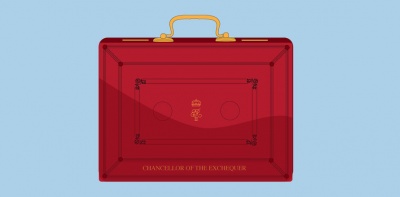Autumn Budget brings additional funding to tackle waste crime and plastic tax consultation
Chancellor Philip Hammond confirmed the launch of a call for evidence on how the tax system or charges could reduce the amount of single-use plastics waste in his Autumn Budget statement today (22 November), while also committing an extra £30 million of funding over the next four years to help the Environment Agency (EA) crackdown on waste crime.
 In a budget that was more about expectation management and caution than grand vision delivered by a beleaguered Chancellor constrained by the downgrading of the UK’s growth forecast for the next five years, there were some offerings in Hammond’s fiscal plans for the coming months to cheer the waste and resources industry.
In a budget that was more about expectation management and caution than grand vision delivered by a beleaguered Chancellor constrained by the downgrading of the UK’s growth forecast for the next five years, there were some offerings in Hammond’s fiscal plans for the coming months to cheer the waste and resources industry.
The launch of a call for evidence on the application of fiscal measures in order to reduce the use of single-use plastics came as no surprise after rumours of its inclusion emerged over the weekend, with the Chancellor referencing David Attenborough’s Blue Planet II and its exposition of the menace of plastic pollution that blights the world’s oceans as eight million tonnes of plastic enters the marine environment every year.
That was the headline waste and resources commitment to attract wider public attention, but burrowed away in the Treasury’s Autumn Budget 2017 document was a commitment to provide the Environment Agency with an additional £30 million over the next four years to help tackle waste crime, in addition to news that, from 1 April 2018, operators of illegal waste sites will become liable for Landfill Tax, while the Landfill Communities Fund would receive £33.9 million for 2018/19.
Besides this, there was little more from the Chancellor for the industry to get out of its seat for, with the Department for Environment, Food and Rural Affairs (Defra) and the Department for Business, Energy and Industrial Strategy (BEIS) both set for departmental resource and capital budget reductions over the next three years.
Defra’s annual resource budget is set to fall by £100 million from £1.6 billion for 2017/18 to £1.5 billion in 2019/20, while BEIS’s resource budget will fall from £1.7 billion to £1.6 billion over the same period. Meanwhile, Defra’s capital budget is set to fall from £700 million in 2017/18 to £500 million in 2020/21, while BEIS’s capital budget will plummet from £10.9 billion to £6.1 billion over the same period.
Furthermore, it remains to be seen how big a cut of the £3 billion allocated for Brexit over the next two years will go to Defra and BEIS and how much of the additional £2.3 billion of R&D funding from the National Productivity Investment Fund (NPIF) earmarked to be in place by 2020/21 will be thrown to the waste and resources sector, with departmental allocations for the Brexit fund to be made in early 2018, while the fate of the R&D funding awaits the publication of the upcoming Industrial Strategy White Paper.
Other environmental commitments included £200 million of funding for a new Charging Investment infrastructure Fund for ultra-low emissions vehicles, electrifying 25 per cent of cars in central government fleets by 2022, and a further £100m to guarantee the operation of the Plug-In Car Grant to allow consumers to purchase electric cars until at least 2020.
For more detail on the Budget, consult the Autumn Budget 2017 Statement on the Treasury’s website. 









